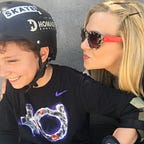The Evolution of a Mother
I’ve reached that phase in life when many of my contemporaries are grieving the death of a parent. Three of my closest friends have lost their fathers in the past year. My own father died when I was in college. He was 6o, young by today’s standards, though not impossibly young. While heartbreaking, it was not completely unexpected, for my father was that tough Italian guy who smoked two packs of cigarettes per day since the age of 12. He was from Naples.
My mother, on the other hand, was impossibly young when cancer took her life. When she died, she was only 41. I had just turned four, three days prior to her passing. My sister was 6. My mother had been ill my entire life. Hence, I have only two memories of her. Not enough. But as they say, quality trumps quantity. By quality, I mean that both memories left strong impressions, not that they were necessarily pleasant.
Memory #1: I guess I must’ve been around two and there I lay, fussing about in my crib. I remember the darkness of the bedroom save for the glare of the street lamp piercing the sheer curtains. My mother knelt beside my crib and started to recite the Hail Mary, only to her, to us, it was Ave Maria. We prayed in Italian, our first language. The mind is tricky and I’m not certain if this memory took place on one evening, or if this remembrance is a compilation of my mother’s nightly ritual of reciting prayers by my cribside. All these years later, I still hear her whispery voice every time I visit that moment. A sweet memory. A dying mother praying to the mother of all mothers to protect her young child as she sleeps, goes through life…
Memory #2: is not as sweet, and much more detailed, vivid even. It was my birthday and I got to have a special day with grandma since my sister was at school. It would be the last time I saw my mother’s eyes. No whispery voice this time. No voice at all. My grandmother took hold of my hand and led me to the elevator bank of Misericordia hospital, where we waited for the nurse to bring down my mother. When the doors opened, the image of the gaunt figure in a wheelchair made my grandmother smile. I cannot recall any words exchanged between them. I can only remember my words. A thoughtless statement uttered by an innocent child. “This is not my mother,” I declared matter of factly. This tragic scenario has followed me and had been repeated throughout my childhood. I was the poor little girl who was unable to recognize her emaciated mother. It was the 70’s, and the community stood by the old proverb, “It takes a village.” My neighbors took turns driving us to school, my friends’ parents escorted my sister and me to school events. Everyone had pity on us, except for the art teacher who insisted I make that Happy Mother’s Day card.
When you lose your mother early on in life, you grow up feeling sorry for yourself. You are so aware of your unique circumstances, that you begin to recognize the knowing look that screams “orphan in the house”, when you walk into a room. We were different at a point in our lives when we just wanted to be like everyone else. My grieving grandmother wore only black clothing every day for the rest of her life; My despondent father turned to alcohol for comfort and we ended up living with my grandparents, who didn’t drive, spoke no English.We were freaks to begin with, as children of Italian immigrants, we ate Nutella on wonder bread for lunch and had dinner at 2 p.m. on Sundays. Now that we were motherless, we were even more disparate.
The absence of a mother, becomes the reason for failed relationships, toxic friendships, and the gnawing low-self esteem that has been the obstacle in reaching your full potential. There is a strength and confidence that comes with knowing you are supported, having that guidance throughout your journey. A mother, a good mother, feels your triumphs and disappointments evenly more profoundly than you do.
The pity party followed me into motherhood. Where is my mother to help me figure out this whole baby thing? There. Is. No. Manual. Who would answer my constant nursing questions, teach me tricks to soothe my colicky baby, make soup for me and hold my baby when I was utterly exhausted? Other members of my mommy tribe would gather to lament incessantly on their meddling mothers and their tendency to cover baby’s backside in powder. I lacked sympathy for them. I wished I had a mother to complain about.
The turning point came when my son turned four, the age I was when my mother died. I wondered if he’d remember me if I was to die then. I perseverated on this thought. Would he think about all the bedtime stories, the walks to school, the nursery rhymes as he swung high, higher…? Would he have only two memories?
How would I feel if my little boy failed to recognize me due to the work of a cruel disease? How did my mother feel? Did her heart break at the realization that her little girl no longer saw her mother in the lifeless face that once held the most radiant blue eyes?
The shift from self-pity to the realization of my mother’s emotional suffering, rather than her physical pain, was sudden and powerful. One that I’m not sure would have come to be if I had not become a mother myself. While we are left to mourn their absence, we can deepen our empathy when we cease to feel that the death of a loved one happens to us.
